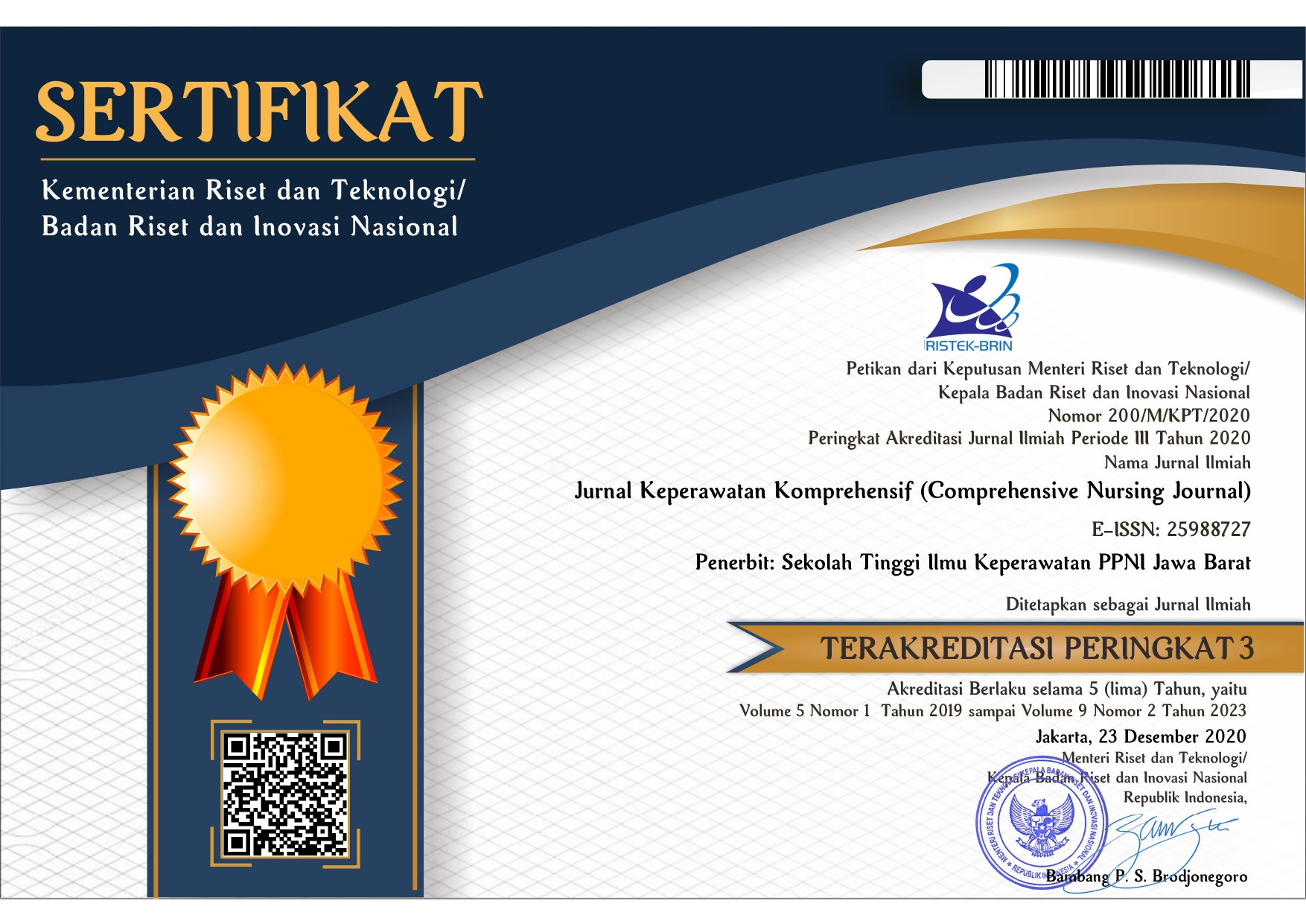The Effect of the TEMAN SETIA Program Intervention on Immunosuppressant Medication Adherence in Post-Kidney Transplant Patients at RSCM Jakarta
Keywords:
medication adherence, kidney transplant, immunosuppressant medication, patient support, family involvementAbstract
Aims: Chronic Kidney Disease (CKD) poses a significant global health challenge, with an increasing number of kidney transplantations in Indonesia. The success of kidney transplants hinges on adherence to immunosuppressant medications to prevent organ rejection. Non-adherence among post-transplant patients can lead to infections, graft loss, or a return to dialysis. This study evaluated the impact of the TEMAN SETIA program on adherence to immunosuppressant medications among post-kidney transplant patients at Dr. Cipto Mangunkusumo National Referral Hospital (RSCM) in Jakarta.
Methods: A pre-post-test design with a control group was utilized. The sample included 28 post-transplant patients meeting inclusion criteria. The TEMAN SETIA program provided patient mentoring to improve adherence. Adherence was assessed before the intervention, one month after, and two weeks post-intervention using a validated questionnaire. Data were analysed using t-tests and repeated measures ANOVA.
Results: The control and intervention groups were comparable in demographic and clinical characteristics, though the intervention group had more non-working participants. The program significantly improved adherence (Cohen’s d = 1.97) and knowledge (Cohen’s d = 1.99). While family support increased in both groups, differences were not significant (Cohen’s d = 1.02). A significant group-by-time interaction (F (1.246, 26) = 7.394, p = 0.007, η² = 0.221) demonstrated greater adherence improvements over time in the intervention group.
Discussion: The findings demonstrate that the TEMAN SETIA program is an effective intervention for enhancing medication adherence and knowledge among post-transplant patients. The structured mentoring approach provided patients with the necessary support and education to improve their adherence behaviors. Although family support increased in both groups, the changes were not statistically significant, highlighting the need for further exploration of the role of familial involvement in adherence programs
Conclusion: The TEMAN SETIA program effectively enhanced medication adherence and knowledge in post-transplant patients. This structured intervention offers a promising strategy to improve outcomes and reduce risks of organ rejection.
References
Mellon L, Doyle F, Hickey A, Ward KD, de Freitas DG, McCormick PA, et al. Interventions for increasing immunosuppressant medication adherence in solid organ transplant recipients. Cochrane Database Syst Rev [Internet]. 2022;(9). https://doi.org/10.1002/14651858.CD012854.pub2
Gandolfini I, Palmisano A, Fiaccadori E, Cravedi P, Maggiore U. Detecting, preventing and treating non-adherence to immunosuppression after kidney transplantation. Clin Kidney J. 2022;15(7):1253–74. https://doi.org/10.1093/ckj/sfac017
Clayton PA, McDonald SP, Russ GR, Chadban SJ. Long-term outcomes after acute rejection in kidney transplant recipients: an ANZDATA analysis. J Am Soc Nephrol. 2019;30(9):1697–707. https://doi. org/10.1681/ASN.2018111101
Lee BT, Fiel MI, Schiano TD. Antibody-mediated rejection of the liver allograft: An update and a clinico-pathological perspective. J Hepatol. 2021;75(5):1203–16. https://doi. org/10.1016/j.jhep.2021.07.027
Hart A, Singh D, Brown SJ, Wang JH, Kasiske BL. Incidence, risk factors, treatment, and consequences of antibody‐mediated kidney transplant rejection: a systematic review. Clin Transplant. 2021;35(7):e14320. https://doi.org/10.1111/ctr.14320
Russell CL, Hathaway D, Remy LM, Aholt D, Clark D, Miller C, et al. Improving medication adherence and outcomes in adult kidney transplant patients using a personal systems approach: SystemCHANGETM results of the MAGIC randomized clinical trial. Am J Transplant. 2020;20(1):125–36. https://doi.org/10.1111/ajt.15528
Zhi-Yu Z, Lin-Rui D, Chen-Zhen Y, Ren-Jie C, Fei-Hong Y, Song C, et al. Immunosuppressant nonadherence profile in kidney transplant recipients and the impact of medication adherence on transplant outcomes. Front Pharmacol. 2024;15:1493166. https://doi.org/10.3389/fphar.2024.1493166
Kostalova B, Ribaut J, Dobbels F, Gerull S, Mala-Ladova K, Zullig LL, et al. Medication adherence interventions in transplantation lack information on how to implement findings from randomized controlled trials in real-world settings: a systematic review. Transplant Rev. 2022;36(1):100671. https://doi.org/10.1016/j.trre.2021.100671
Akşit N, Özbaş A, Akıncı S. Assessment of the effectiveness of patient education and interviews in improving medication adherence of renal transplant recipients. Cureus. 2022;14(12). https://doi.org/10.7759/cureus.33010
Low JK, Williams A, Manias E, Crawford K. Interventions to improve medication adherence in adult kidney transplant recipients: a systematic review. Nephrol Dial Transplant. 2015;30(5):752–61. https://doi.org/10.1093/ndt/gfu204
Wurm F, McKeaveney C, Corr M, Wilson A, Noble H. The psychosocial needs of adolescent and young adult kidney transplant recipients, and associated interventions: a scoping review. BMC Psychol. 2022;10(1):186. https://doi.org/10.1186/s40359-022-00893-7
Faul F, Erdfelder E, Lang AG, Buchner A. G* Power 3: A flexible statistical power analysis program for the social, behavioral, and biomedical sciences. Behav Res Methods. 2007;39(2):175–91. https://doi.org/10.3758/BF03193146
Lakens D. Calculating and reporting effect sizes to facilitate cumulative science: a practical primer for t-tests and ANOVAs. Front Psychol. 2013;4:863. https://doi.org/10.3389/fpsyg.2013.00863
Al-Qazaz HK, Hassali MA, Shafie AA, Sulaiman SA, Sundram S, Morisky DE. The eight-item Morisky Medication Adherence Scale MMAS: translation and validation of the Malaysian version. Diabetes Res Clin Pract. 2010;90(2):216–21. https://doi.org/10.1016/j.diabres.2010.08.012
Megawati, Yetti K, Sukmarini L. The factors affecting the quality of life of kidney transplantation patients at the Cipto Mangunkusumo General Hospital in Jakarta, Indonesia. Enfermería Clínica. 2019;29:428–33. https://doi.org/10.1016/j.enfcli.2019.04.063
Visser R. HUBUNGAN TINGKAT PENGETAHUAN TERHADAP SIKAP TENTANG TRANSPLANTASI GINJAL PADA MAHASISWA FAKULTAS KEDOKTERAN UNIVERSITAS YARSI ANGKATAN 2015 DITINJAU DARI KEDOKTERAN DAN ISLAM. Universitas YARSI; 2018. http://digilib.yarsi.ac.id/id/eprint/13746
Ampofo AG, Khan E, Ibitoye MB. Understanding the role of educational interventions on medication adherence in hypertension: A systematic review and meta-analysis. Hear Lung. 2020;49(5):537–47. https://doi.org/10.1016/j.hrtlng.2020.02.039
Thomson P, Rushworth GF, Andreis F, Angus NJ, Mohan AR, Leslie SJ. Longitudinal study of the relationship between patients’ medication adherence and quality of life outcomes and illness perceptions and beliefs about cardiac rehabilitation. BMC Cardiovasc Disord. 2020;20:1–11. https://doi.org/10.1186/s12872-020-01378-4







